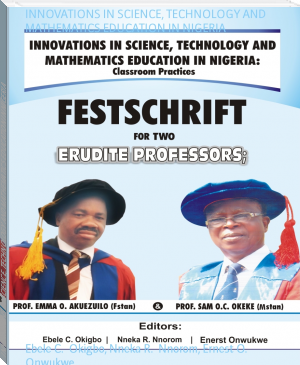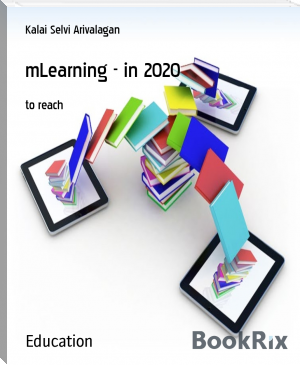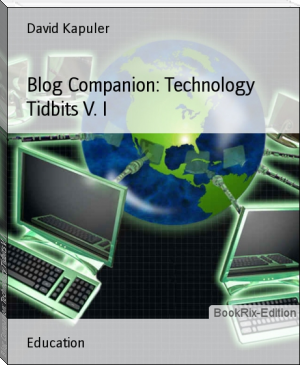INNOVATIONS IN SCIENCE, TECHNOLOGY AND MATHEMATICS EDUCATION IN NIGERIA - Ebele C. Okigbo, Nneka R. Nnorom, Ernest O. Onwukwe (best novel books to read TXT) 📗

- Author: Ebele C. Okigbo, Nneka R. Nnorom, Ernest O. Onwukwe
Book online «INNOVATIONS IN SCIENCE, TECHNOLOGY AND MATHEMATICS EDUCATION IN NIGERIA - Ebele C. Okigbo, Nneka R. Nnorom, Ernest O. Onwukwe (best novel books to read TXT) 📗». Author Ebele C. Okigbo, Nneka R. Nnorom, Ernest O. Onwukwe
In recognition of this, Nigeria, aligning with many countries has emphasized a type of educational system that provides equal access to all citizens at primary, secondary and tertiary level and both inside and outside the normal school system.
This has led Nigeria to taking some steps to improve the situation. In 1976 for instance, Nigeria launched the universal primary education (UPE) scheme to make education accessible to every Nigerian child and even unfortunate adults who were not earlier exposed to primary education. Later, in 1990, Nigeria joined agencies like UNICEF, world bank and others in adopting education for all (EFA). Sequel to this, a disconcerted attempt was made to sustain this venture. Such effort as introduction of universal basic education (UBE) in 1977 is all in the bid to ensure that every Nigerian citizen is literate to a certain level and is useful to the society (Umo, 2013). In line with the first and second goals of EFA which are stated as follows: Education that is extended to all should aim at:
Goal 1: expanding and improving comprehensive early childhood care and education especially for the most vulnerable and disadvantaged children
Goal 2: ensuring that by 2015, all children particularly girls, children in difficult circumstances and those belonging to ethnic minorities, have access to, and complete free and compulsory primary education of good quality. Although 2015 has come and gone, these goals still need to be pursued. Hence, it becomes very important to introduce a type of education that will include all. This justifies the need for inclusive education that will help to address and ameliorate the deplorable situation in Nigeria, a country, according to Abayomi in Udehi (2014) that harbors some 64 million illiterates, a shameful situation in the 21st century. Some countries have already fully adopted this system of education while in others; it is still at the nurturing stage. In Finland for instance, all students, even those with the most severe developmental impairment receive similar basic education. Over 99.7% complete 9-years of comprehensive school (Koivula, 2012).
Inclusive education has been variously defined by many authors (Jordan, &Mc Ghie-Richmond, 2009; Sambo & Gambo, n. d.). In the words of Jordan, & Mc Ghie-Richmond (2009), inclusive education is defined as a learning environment that promotes the full personal, academic and professional development of all learners irrespective of race, class, colour, gender, disability, sexual preference, learning style and language. As an approach, inclusive education ensures the presence, participation and achievement of all students in education. This may be in formal schools, or in non-formal places of learning, such as extra-curricular clubs and humanitarian camps. It often involves working to change the structures, systems, policies, practices and cultures in schools and other institutions responsible for education, so that they can respond to the diversity of students in their locality. Inclusion emphasizes opportunities for equal participation, but with options for special assistance and facilities as needed, and for differentiation, within a common learning framework. (Sightsavers, 2011).Florian and Linklater (2010) also maintained that inclusive education has been internationally recognized as a philosophy for attaining equality, justice and quality education for all children especially those who have been traditionally excluded from mainstream education for reasons of ethnicity, gender or other characteristics. Effective inclusion practices and therefore overall effective teaching depends in part on the belief of teachers about the nature of disability and about their roles and responsibilities in working with students with special education needs (Jordan, &Mc Ghie-Richmond, 2009). It is a process of addressing and responding to diverse needs of all learners by increasing participation in learning and reducing exclusion within and from education That is to say, all children have the right to a quality education that caters to the extent possible, to their individual needs (UNESCO, 2015).
Principles of Inclusive Education
The principles of inclusive education maintain that no student should be discriminated against. All learners should be exposed to equal educational opportunities which are adaptable to the needs of each individual student and providing equal educational benefit for all students as well. In this form of educational system, every student’s views are listened to and taken seriously while individual differences between students are a source of richness and diversity and not a problem.
Aims and Objectives of Inclusive Education.
Inclusive education has the following aims and objectives. It is aimed at providing education for all, protection of right of every student, identification of skills possessed by each student irrespective of whether the student is normal or disabled, development of social consciousness and brotherhood in students, preparation for new challenges that can accrue and to improve quality of education given to every student.
Role of Teachers
Teachers involved in inclusive education are to play the following roles; Interaction with family, ability to solve students’ problems, developing new learning strategies, developing self-confidence, provision of special facilities, ability to look after personal needs and ability to recognize students hidden talents and to inculcate positive attitude in the able-bodied children.
Hence, it is very necessary to train and re-train special educators and properly deploy the available trained special educators at primary and secondary school levels. As the argument still ranges whether the inclusion education would achieve the desired effect, the fact remains that there is need to grant education opportunity to every child, whether challenged or normal.
Teaching Strategies for Inclusive Education
The most effective teaching strategies to be adopted in teaching children with special needs are such learner-friendly strategies as peer-tutoring, co-operative learning, multi-sensory and other constructivist teaching method.
Design of Classroom for Inclusive Education
Size of class: should be small probably not more than ten to enable the teacher avail himself to attend judicially to the students’ needs
Teaching aids should be used and include the types the disabled children could conveniently benefit from
Restriction of time, Arrangement of light and general attention to physical needs of students should be of utmost interest to all stakeholders
Special attention to disabled children
Teacher to include normal, gifted children, mentally challenged children, physically challenged children in their classrooms
Some strategies to improve inclusive education are mainstreaming, encourage students, improve textbooks, special training to teachers, special care of special children, improve method of teaching and provision of required resources (Kurth & Foley, 2014).
Practice of Inclusive Education
The practice of developing inclusive schools involves knowledge of inclusion as something progressive, not as one-time event, consolidating and sustaining the participation of all students, teachers, parents and community members in the work of the school, restructuring the culture, policies, and practices of inclusion in schools to respond to the diversity of pupils within their locality, providing an accessible curriculum, appropriate training programmes and support for all, staff as well as students (Choudhary, 2015).
Special needs education, the type of education suitable for use in inclusive education system is widely seen as one of the mechanisms by which students who experience difficulties in learning are both included in and excluded from the forms of schooling that are otherwise available to children of similar age. The role of teachers in the provision of this form of education cannot be over-emphasized. Inclusion requires teachers to accept the responsibility for creating schools in which all children can learn and feel they belong. Inclusive education system views that if a child is not learning, the problem lies in the education system and not in the disabled child (Christopher & Elizabeth, 2012). The difficulty arises either as a result of poor experience on the part of the teacher who may also be untrained and impacting poor quality of teaching or due to the rigid methods and curriculum, inaccessible environment, lack of proper attitude on the part of teachers and poor quality of support from the public agencies and many more. In this way, the focus shifts from making the education system responsible. The teachers’ role is not just to teach the subject but also to provide other trainings such as mobility training, self-care training, preparation of teaching materials according to the needs of the disabled children, training in the use of maintenance of aid and so on. It is often argued that a lack of knowledge on the part of classroom teachers, attribute of lack of training is the main barrier to inclusion. Inclusion involves the use of support, the way in which teachers respond to individual differences during whole class teaching, the choice they make about group work and the utilization of specialist knowledge.
Teacher Preparation for Inclusive Education
To have effective and sustainable education for person with special needs, adequate teacher preparation in the system is imperative. Persons with special needs have over the years suffered a lot of setbacks in their education in Nigeria. This is because of lack of adequate schools, dearth of properly and professionally trained personnel and lack of support services for effective inclusion. This has resulted in many people with special needs in Nigeria never having opportunity to be educated in the inclusive service. In Nigeria the practice of inclusive education is a mirage and theoretical as there are no proper policy frame works to galvanize the system.
Looking at inclusive education vividly, teachers are the driving force to the success of the programmes, including students with disabilities into regular classes. The prepared teachers if of high quality are the custodian to advocates inclusive education programmes in order to make it more realistic and profitable to persons with special needs who usually kick against discrimination and stigmatization that is usually accorded to them by the populace. Inclusion is the principle applied to accommodate/include all human beings, thus the full spectrum of diverse abilities, with one system, in such a manner that all involved can be assured of successful, equal and quality participation in real-life experiences from birth todeath (Burden, 2008). Inclusion of students with special needs education especially those who need specialized skills and technical support give more rise to challenges to the training of teachers to produce quality one to handle such children in questions.
As stipulated in article 223 of UN’s child right convention endorsed in 1989 special need children have the right to enjoy in full, decent life in conditions which ensure dignity, promotes self-reliance and facilitate the preparation in inclusive education. Special need persons are individuals who require assistance for disabilities that may be medical or psychological. Types of special need vary in severity. According to Okwudire, and Okechukwu, (2008),people with autism, down syndrome, dyslexia, blindness, attention deficit hyperactivity disorder (ADHD) or cystic fibrosis are considered to have special needs. It also includes cleft lips, palate, port-wine stains and messing limbs.
The objectives of national policy on education (FME, 2004) to special need persons is to enable them perform and benefit from adequate educational planning and welfare programme. Special need persons (SNP) are characterized with such traits like communication challenges, emotional and behavioral disorder etc. they are therefore supposed to benefit from additional educational services which is a different approach to teaching and use of technology such as assistive technology. Ajuwon in Mefor (2011) stressed that ordinary schools should cater to all children and young people regardless of their circumstances or personal characteristics.
Internationally, the Salamanca statement on inclusive education called on government worldwide to provide a more inclusive education system that is underpinned by an ideological position based on recognition that all pupils should have a fundamental right and equal opportunity to experience education in mainstream schools (UNESCO, 1994). Looking at inclusive education vividly, teachers are the main driving force to the success of the programmes including students with disabilities into regular classes.
Benefits of inclusive education to persons with special needs
Families vision of a typical life for their children can come true: all parents want their children to be accepted by their peers, have friends and lead regular lives, inclusive settings can





Comments (0)